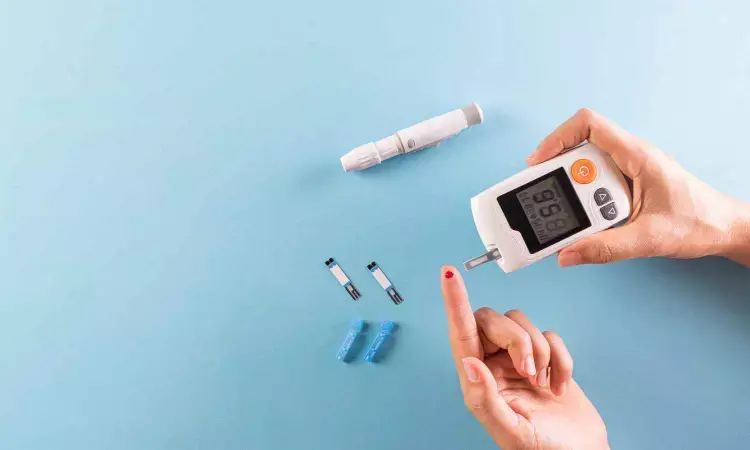- Home
- Medical news & Guidelines
- Anesthesiology
- Cardiology and CTVS
- Critical Care
- Dentistry
- Dermatology
- Diabetes and Endocrinology
- ENT
- Gastroenterology
- Medicine
- Nephrology
- Neurology
- Obstretics-Gynaecology
- Oncology
- Ophthalmology
- Orthopaedics
- Pediatrics-Neonatology
- Psychiatry
- Pulmonology
- Radiology
- Surgery
- Urology
- Laboratory Medicine
- Diet
- Nursing
- Paramedical
- Physiotherapy
- Health news
- Fact Check
- Bone Health Fact Check
- Brain Health Fact Check
- Cancer Related Fact Check
- Child Care Fact Check
- Dental and oral health fact check
- Diabetes and metabolic health fact check
- Diet and Nutrition Fact Check
- Eye and ENT Care Fact Check
- Fitness fact check
- Gut health fact check
- Heart health fact check
- Kidney health fact check
- Medical education fact check
- Men's health fact check
- Respiratory fact check
- Skin and hair care fact check
- Vaccine and Immunization fact check
- Women's health fact check
- AYUSH
- State News
- Andaman and Nicobar Islands
- Andhra Pradesh
- Arunachal Pradesh
- Assam
- Bihar
- Chandigarh
- Chattisgarh
- Dadra and Nagar Haveli
- Daman and Diu
- Delhi
- Goa
- Gujarat
- Haryana
- Himachal Pradesh
- Jammu & Kashmir
- Jharkhand
- Karnataka
- Kerala
- Ladakh
- Lakshadweep
- Madhya Pradesh
- Maharashtra
- Manipur
- Meghalaya
- Mizoram
- Nagaland
- Odisha
- Puducherry
- Punjab
- Rajasthan
- Sikkim
- Tamil Nadu
- Telangana
- Tripura
- Uttar Pradesh
- Uttrakhand
- West Bengal
- Medical Education
- Industry
Biosimilar Liraglutide Matches Reference in Weight Loss and Glycemic Control in Indian T2DM: Study

Obesity is a chronic metabolic disease of global concern, often associated with Type 2 Diabetes Mellitus (T2DM).
Global guidelines recommend a holistic approach for Type 2 Diabetes Mellitus management by addressing the associated comorbidities. Here, we have conducted a post-hoc evaluation of a Liraglutide biosimilar Phase III trial on weight reduction and glycemic benefits in Indian Type 2 Diabetes Mellitus patients with obesity in comparison to reference liraglutide.
They have conducted a post-hoc analysis of a Liraglutide biosimilar Phase III trial on weight reduction in Indian Type 2 Diabetes Mellitus patients with obesity in comparison to reference liraglutide.
We evaluated weight reduction and glycated hemoglobin (HbA1c) improvement in Indian Type 2 Diabetes Mellitus patients (Body Mass Index greater than 25 kilograms per square meter) from baseline to week 24.
Group A – Intervention arm: Liraglutide Biosimilar in Type 2 Diabetes Mellitus patients with obesity.
Group B – Control arm: Reference Liraglutide in Type 2 Diabetes Mellitus patients with obesity. The primary endpoint was the mean change in body weight from baseline to week 24.
Results: A total of 179 Type 2 Diabetes Mellitus patients (Body Mass Index greater than 25 kilograms per square meter and above) who satisfied the inclusion criteria were included in this post-hoc analysis. The mean Body Mass Index of Type 2 Diabetes Mellitus patients with obesity in the Biosimilar Liraglutide arm was 29.8 ± 4.6 kilograms per square meter, and in the Reference Liraglutide arm, it was 29.8 ± 4.8 kilograms per square meter.
A significant mean weight reduction (Mean ± Standard Deviation) of 5.5 ± 1.2 kilograms (7.3 ± 1.7%) and 7.1 ± 2.6 kilograms (8.9 ± 1.7%) (p < 0.001) was demonstrated by both biosimilar liraglutide and reference liraglutide, respectively. However, weight reduction was comparable across both groups at week 24 (p = 0.71). Likewise, glycemic parameters (glycated hemoglobin, fasting plasma glucose, and postprandial plasma glucose) significantly improved in both treatment arms (p < 0.001).
However, they were comparable across the groups at week 24 with a p-value of 0.89, 0.43, and 0.17 for glycated hemoglobin, fasting plasma glucose, and postprandial plasma glucose, respectively. Biosimilar Liraglutide at a dose of up to 1.8 milligrams was non-inferior to reference Liraglutide and resulted in significant weight reduction and glycemic control (glycated hemoglobin, fasting plasma glucose, and postprandial plasma glucose) in Indian Type 2 Diabetes Mellitus patients with obesity.
Dr. Shravani Dali has completed her BDS from Pravara institute of medical sciences, loni. Following which she extensively worked in the healthcare sector for 2+ years. She has been actively involved in writing blogs in field of health and wellness. Currently she is pursuing her Masters of public health-health administration from Tata institute of social sciences. She can be contacted at editorial@medicaldialogues.in.
Dr Kamal Kant Kohli-MBBS, DTCD- a chest specialist with more than 30 years of practice and a flair for writing clinical articles, Dr Kamal Kant Kohli joined Medical Dialogues as a Chief Editor of Medical News. Besides writing articles, as an editor, he proofreads and verifies all the medical content published on Medical Dialogues including those coming from journals, studies,medical conferences,guidelines etc. Email: drkohli@medicaldialogues.in. Contact no. 011-43720751


